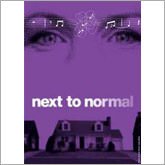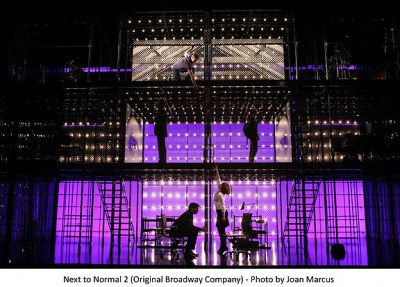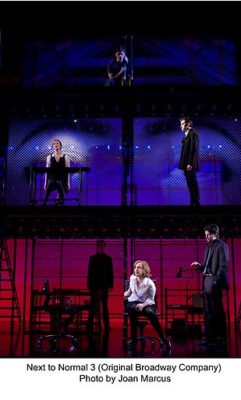next to normal
Book and Lyrics by Brian Yorkey
Directed by Michael Greif
Musical direction by Bryam Perri
Produced by Broadway In Chicago
At the Bank of America Theatre, Chicago
Pop-rock score gives weird vibe for dark story about mental illness
Why anyone would want to make a musical about mental illness and it’s debilitating effects on a family is one of life’s mysteries? And, if anyone really must have such darkness expressed in song, they best use serious baroque or other classical chamber music influences to express the pain, angst and agony of the mentally ill on and her dysfunctional family. Instead, we have an amazingly un-melodic and forgettable score that is so rock-infused that every song and every singer sounded alike. I mean throughout. Next to Normal arrives for a one week run at the Bank of America Theatre in a glitzy manic production.
I knew the songs would hardly be memorable when they we not listed in the Playbill. Much of the show relied on “talk-songs” that found the players singing their dialogue that mostly ended up becoming a soaring anthem that necessitated much screaming over the pounding percussion. That Broadway pop-rock style of singing that finds singers holding a note in a predictable place every so many words becomes redundant and ‘sing-song-y-like.’ After four or five songs, my ear waited for the long drawn out word at the end of a line: “I am a-l-i-v-e–a–a-l-l-i–i–v–e” sings Gabe. This style irritates me with its sameness and frequency that ultimately leads to screaming at the songs climax. Blame Rent for starting this awful trend.
The subject matter: the life-long struggles of a mentally ill mother and wife suffering from bipolar disorder just didn’t work for me as a rock musical. Tony Award winner Alice Ripley was unimpressive as Diana – the mentally challenged mother. Her voice seem raspy and throaty. Asa Somers, as Dan, the devoted husband sang his heart out but his shaky voice seem strained by the demands of that rock singing style. Emma Hunton, as the rebellious daughter Natalie, screamed through her numbers. The women and the men each sounded so much alike in style and vocally that, at times, I wasn’t sure who was singing.
The story has nothing profound or insightful to offer concerning mental illness and the score was tepid and forgettable. I guess I’m just too old fashion to appreciate a pop operetta? I just can’t see the merit and enjoyment factor in a “downer” musical like Next To Normal? Fans of rock musicals will enjoy this show more that I did.
Somewhat Recommended
Tom Williams
Talk Theatre in Chicago podcast
Will Fink’s Review:
Next to Normal
I promise, as soon as Broadway in Chicago brings something worthwhile to this city, I will tell you (and have done). But Next to Normal does not qualify. It is bland, trite, and thoroughly mediocre. Which is not to say its heart isn’t in the right place . . . but I seem to be getting ahead of myself.
Next to Normal is a musical about a woman with bipolar disorder (plus some), who goes through manic and depressive phases, as well as delusions: she occasionally sees her son, who, we find out about 20 minutes in, died 17 years ago. And this play wants to treat this woman, who is going through so much, with respect. It wants to tap into the current push advocating the (at least potential) normalcy of individuals with bipolar disorder. And that’s something, Christ knows, I can get behind 100% – because it is a social stigma to have the disease, and that hardly helps the people who suffer from it. So, I applaud the writers and producers of this play for attempting to be advocates of this movement. But, sadly, they fall short of that. For one thing, this woman is particularly troubled (seeing your dead infant son as the age he would be, had he lived, is sort of beyond the pale for the disorder); and they also seem to not quite be able to decide what they want to say about treatment. They’re anti-Pharma (something, again, I can get behind: I’ve had too many friends who hated taking their drugs, especially when that was the main part of the treatment, because it made them feel like they were living a life without emotions or colors); but then psychotherapy doesn’t work, either. They have their most sympathetic doctor, the one who really wants to help her and wants the best for her, really invests, force her into shock therapy, which also doesn’t work. “What if it’s not in my mind, or my brain, but in my soul?” she asks, banally. And throughout, the son is singing about how he controls her, and how to start the healing process. “If you can’t grieve me, you can’t leave me,” for one, and later he seems to say that if she could just acknowledge his name, she’d be all better. Well, things don’t work like that. And they don’t end up that way at the end of the play, but even saying something like that trivializes the disorder. So, they ultimately fail to be true advocates.
And the piece itself – the music, the plot generally – is very middle-of-the-road. It really strives for that “Broadway Sound” – you know, actors with choked voices singing with too much vibrato, holding single syllables for far longer than really necessary. Which is not to say that the actors on stage aren’t good singers. That’s not the case: they’re most all good singers, they just have to sing in this abhorrent style, which is neither healthy nor aesthetic. The lyrics are miserable. They’re just depressingly bad. With lines like, “Reading the obituaries, wishing you were dead,” they really clunk along. I started a list on the program of absolutely tepid rhymes:
- Try/cry
- Hear/clear
- Share/nowhere
- Years/tears
- Rain/pain
- Head/dead
- Know/go
- Heard/word
- Side/wide/suicide
- Hurt and how/give up now
- Known/alone
- Brain/pain
- Me/Henry
- Fears/years
- Whole/soul
- Room/bloom
- Dirt/hurt
- Despair/there
- Try/get by
- Light/sight
And then I ran out of room. They’re only worse with the rest of the lines. It was like someone started a collection of all the most ordinary, standard, overused rhymes out there, and decided to write a musical around them. The music itself occasionally had its moments, but more than once it sounded like someone wishing they could be Warren Zevon. But no one can be Warren Zevon, to try is folly, and to do so when your music just isn’t very good is simply insulting. He was arguably one of the best songwriters and composers of the last 50 years. You are not. If you really want to learn how to coin a phrase, give a song a twist, or write really Somewhat Recommended
Will Fink
Date Reviewed: April 27, 2011
At the Bank of America Theatre, 18 W. Monroe, Chicago, IL, call 800-775-2000, www.broadwayinchicago.com, tickets $32 – $95, Tuesdays thru Thursdays at 7:30 pm, Fridays at 8 pm, Saturdays at 2 & 8 pm, Sundays at 2 & 7:30 pm, running time is 2 hours, 15 minutes with intermission, through May 8, 2011







What is wrong with Chicago critics? I saw this show in New York and haven’t been able to stop thinking about it. This “glizty manic production” is staged the way it is because it is a glimpse inside the mind of the main character, Diana. “Next to Normal” is probably one of the bravest musicals I have ever seen because actually dares to NOT gloss over the truth of how someone’s bi-polar disorder can literally destroy a family. Both of these reviews make it sound like a fluke that the show won the Pulitzer Prize and that Alice Ripley won a Tony award for this show.
About the music – it has to sound the way it does because first, it takes place modern day and baroque music would not be in any way appropriate and second (and most importantly) the play is a glimpse inside Diana’s mental state (that’s why you see her eyes on the video screens). Of course it’s going to have a frenetic rock score.
As a side note, and this comes from a theater professional who wrote theater for over eight years, the second you start to take notes on your program about the rhyme scheme, you’ve given up. You should leave the theater at this point because you have lost your objectivity.
As a former theatre critic yourself – Joe Bowen – you know it is amazing you think because a critic takes notes that he should leave the theatre. What is that about? Go see this show to witness the terrible singing from the tony award winner. Many folks also complained about her singing on Chris Jones’ blog. I can see why you no longer review with your lack of ethics by placing such comments. You should be ashamed of your self!
Tom Williams
Tom
In calling out a former critic, you fail to respond to each of his entirely valid points–you lose all ethos by throwing a temper tantrum rather than engaging in intelligent debate when someone disagrees with you.
Ripley’s voice is perfect for the role–like steel wool–it’s rough and ragged and scrubs straight down to the core. Yes, sometimes she has to claw her way up to pitch, which for me in perfectly in-sync with the intense mental distress of the character. There is nothing glamorous about struggling with mental illness; why shouldn’t her performance reflect this truth?
Why did this play win the Pulitzer Prize? For the very thing you want baroque music and classically trained singing to cover up–the visceral vulnerability; the honest truth. This play is fearless. Perhaps you are afraid of the brutal truth presented in this piece. This production strips away the “Broadway” nonsense you are desperately searching for and presents raw, exposed humanity, and indeed this can be difficult to watch. But I admire the writers’ ability to tackle the complex human psyche through rock music–the most raw form of musical expression. Rock music, as opposed to any other type, has the ability to reach out and grab an audience member by the throat and say “Look–this is me! This is pain! This is struggle! DON’T LOOK AWAY!”
I am saddened that you did not accept its invitation, and that it was too much for you, and that you looked away. Because to give over is to have a theatrical experience unlike any other: the revelation of universal human truths.
I stand by my review and state that they replaced the Star with her understudy. There were many commentators on other blogs who complained about her singing.
I simply hated the show and so did my 23 year old fellow reviewer.
Its terrific that you enjoyed the show enough to comment but it saddens me that you didn’t use your name but I do know who you are, Scott. It always carries more weight if you stand behind your beliefs. “Anonymous” never works when a simple email address search yields who you are. I admire your passion!
I would also like to disagree with the comments of the reviewers, although I Like most of the city of Chicago did not get to see Alice Ripley in this role but saw the understudy. I thought that Pearl Sun stole the stage as Diana and brought the role to life in a way that did not seem to be recognized by the reviewers.
As someone who has listened to the soundtrack more times then I would like to admidt, I will agree with some of the comments on their vocal tones and that was something that was noticed but I think the show itsself should have moved just about anyone to tears in the end with Diana’s decision. I think that this show talks about mental illness like nothing e;se has before and I think I will have to disagree with the reviewers in this case
Dan
I have not seen the play myself, but I have friends who have seen it in town and are in love with it. As a Psych major, the concept interests me but after reading your review I’m not sure if I want to spend the money on it. Everyone makes valid points both for and against; however, this is not the reason I feel compelled to comment.
Tom, I find it immature and actually quite rude that you would post Joe’s full name and especially then Anonymous’ name. By looking up the email given in order to childishly (and almost maliciously, I might dare to say) post his name, you are abusing your powers as an Admin. If someone posts as Anonymous, respect their wishes and keep them anonymous whether you agree with it or not.
P.s. Listen to the soundtrack before you judge Alice Ripley’s voice. Rumor has she had a concert in town during the production and might have taken a break to prepare her voice for that (hence the understudy). Also, keep in mind that the show has been touring for awhile and with how hard she throws herself into the musical, it is not surprising if her voice and body start to take a toll.
I find that those who wish to be “anonymous” to be gutless folks–I always stand behind my views. Why do you make excuses for a performer who sounded so raw–folks on other blogs has said the same. The understudy has replaced her 3 times in the last week. At $95 + per ticket, audiences deserve better. I don’t need to listen to the soundtrack–I hear her on opening night in Chicago–she was terrible. And if she did a concert while having vocal troubles-shame on her- the production deserves better.
It seems we get a little to personel with our comments on this show. Lets be honest , the only Reason Next to Normal won the Tony is because Billy Elliot was winning to many awards. If it wasn’t for Hair and God of Carnage the whole show would have been the Billy Awards. I have to admit I found her voice like nails on a blackboard. And for an OK show it def doesn;t deserve to be priced like a Broadway show..
I can buy the fact that some of the rhymes may have been too obvious, and the “me”/”Henry” rhyme didn’t work that well for me. But come on! In this age of “false” rhymes, I hardly think Yorkey should be criticized for rhyming perfectly reasonable words like “whole” and “soul.” I found his lyrics overall to be excellent, surprising, witty and smart. Most important: they were crucial elements that carried plot forward and illuminated different aspects of characters and their relationships. I detected only one false rhyme, and the scansion seemed right on (though “obituary” seemed a bit off). Brian Yorkey is a graduate of the BMI workshop and clearly knows what he’s doing as a lyricist. Listen again, and you’ll hear someone who abides by tradition and infuses it w/ his own flair.